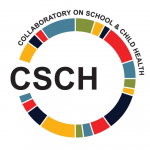Editor’s Note: The following was originally published on the UConn Collaboratory on School and Child Health (CSCH) website. Board of Trustees Distinguished Professor of Educational Psychology Sandra Chafouleas is the co-director of CSCH.
 The Neag Foundation has provided the UConn Collaboratory on School and Child Health (CSCH) with a two-year grant to facilitate work in the Think about the Link Project. The project builds from the Centers for Disease Control and Prevention’s Whole School, Whole Community, Whole Child (WSCC) model to fully acknowledge the many interrelated components involved in supporting student well-being. Think about the Link offers practical tools to help schools enhance their work by incorporating the WSCC model in decision-making across academic, social, emotional, behavioral, and physical supports.
The Neag Foundation has provided the UConn Collaboratory on School and Child Health (CSCH) with a two-year grant to facilitate work in the Think about the Link Project. The project builds from the Centers for Disease Control and Prevention’s Whole School, Whole Community, Whole Child (WSCC) model to fully acknowledge the many interrelated components involved in supporting student well-being. Think about the Link offers practical tools to help schools enhance their work by incorporating the WSCC model in decision-making across academic, social, emotional, behavioral, and physical supports.
“The school environment is shaped by policies and practices, which have a significant influence on student physical health, social and emotional well-being, and academic achievement,” says Sandra Chafouleas, Board of Trustees Distinguished Professor in the UConn Neag School of Education and CSCH co-director, who also is principal investigator for the project. “There is tremendous value in a comprehensive model such as the WSCC in addressing whole child and school needs. But to fulfill that promise, usable tools are needed to guide coordination of polices and practices.”
Through a new two-year grant, the Neag Foundation will help the Collaboratory on School and Child Health to continue its mission to facilitate connections across research, policy, and practice arenas relevant to school and child health.
As part of the Think about the Link project, CSCH developed an innovative and comprehensive tool in partnership with the UConn Rudd Center for Food Policy and Obesity. The WellSAT WSCC helps district leaders and school teams evaluate the quality of their policies in alignment with the comprehensive WSCC model. The Neag Foundation funding, which includes $100,000 in the first year of the two-year grant, will help CSCH to continue to provide technical assistance to school districts through Connecticut and will enable CSCH to move the current WellSAT WSCC tool into a dynamic, interactive website in order to enhance its usability and efficiency for widespread use.
“As a team, we’ve been able to harness our collective expertise on school health to support projects with the Connecticut State Department of Education (SDE),” says Marlene Schwartz, professor in human development and family sciences, director of the UConn Rudd Center for Food Policy and Obesity, and CSCH Steering Committee member. “We are thrilled to work with Connecticut districts and the SDE to document the value of using the WSCC model in policy and practice.”
The Collaboratory on School and Child Health falls within the UConn Institute for Collaboration on Health, Intervention, and Policy (InCHIP). The CSCH mission is to facilitate innovative and impactful connections across research, policy, and practice arenas relevant to school and child health. CSCH serves as a central resource to university and external partners engaged in efforts that inform healthy, safe, supportive, and engaging environments for all children.
 Facebook
Facebook
 Twitter
Twitter
 LinkedIn
LinkedIn
